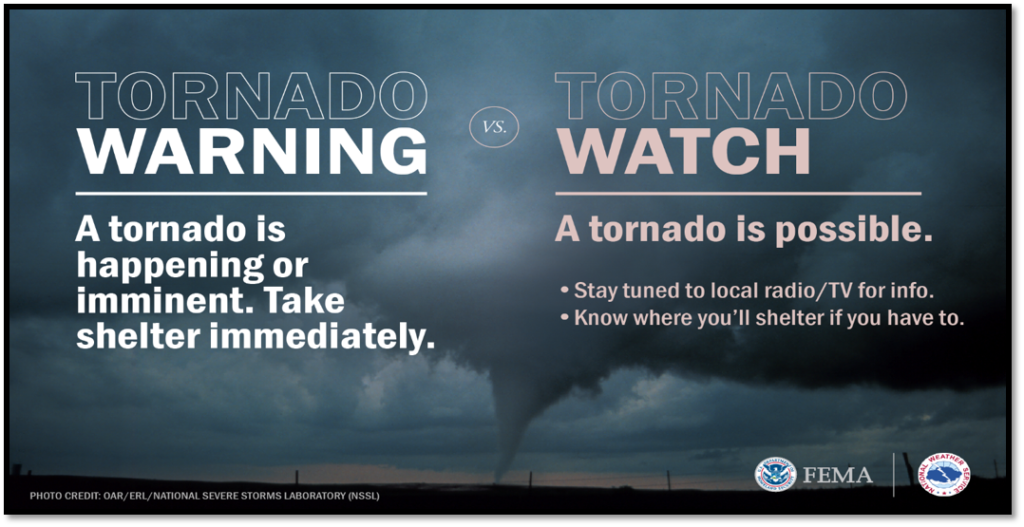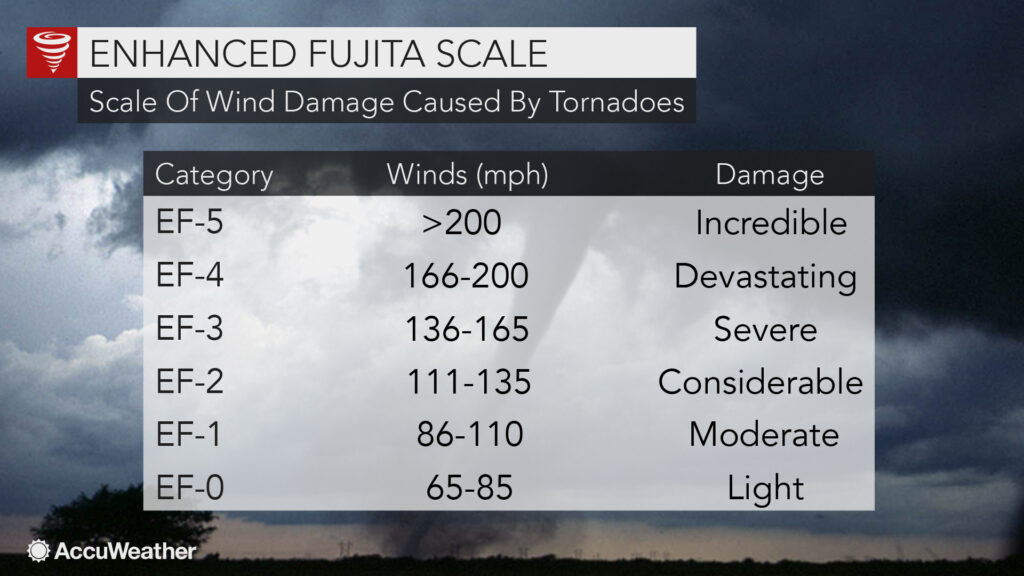Last Updated: March 27, 2022
It’s Tornado Awareness Month! You might be surprised to learn that Florida leads the nation with 12.2 tornadoes per 10,000 square miles, ranking nationally at #3. Tornado alley states like Kansas ranks #2 at 11.7, and Oklahoma ranks at #7 with 9 tornadoes per 10,000 square miles. It’s important to have a plan, know the signs of a tornado and have an emergency supply kit on hand.
While tornadoes can happen at any time, June is the most popular month, and spring and summer are the most common times of year for Florida to have tornadoes.
What To Do Before A Tornado
Tornadoes can occur with little to no warning. Taking precautions in advance can help you stay safe if a tornado occurs in your area.
- Develop a Plan: Make sure to have a plan in place to communicate with friends, family, and staembers. Create a communications plan, build an emergency kit, determine if you’re staying or evacuating, and have a Business Continuity Plan in place. Ensure that everyone is informed.
- Review Your Insurance Policy: It’s always important to review your policy to make sure you have enough coverage. Every year, many homeowners realize they’ve purchased inadequate policies and by then, it’s too late. Standard homeowners and business insurance policies cover wind damage caused by tornadoes. Check with your agent to confirm.
- Download Weather Apps & Alerts: Set up Wireless Emergency Alerts on your mobile phone. Stay alert by listening to the radio, TV or NOAA Weather Radio. Public Warning Sirens are used in many towns to warn residents of tornadoes. Know the difference between tornado watches and warnings.
- Protect Your Home and/or Business: Consider installing impact windows and storm shutters for your property. This can help prevent damage to your property from wind and rain. Take photos of the exterior and interior of your property for your insurance claim. Trim trees and branches that are near your property that pose a threat to your windows or roof structure. It’s important to get routine roof and property inspections from a licensed general contractor to ensure that your property is safe and sound. Our expert inspectors at VCGFL provide residential and commercial inspections, in addition to comprehensive roofing and exterior envelope inspections.
- Know the Signs: Severe thunderstorms can produce a tornado, violently rotating column of air that extends from the thunderstorm to the ground. A funnel-shaped cloud that extends towards the ground is perhaps the most commonly known sign. Pay attention to these other cues that could warn you of a nearby tornado: dark , green-colored sky; a loud roar that sounds like a freight train; debris falling from the sky; an approaching cloud of debris at ground level, and a large, dark low-lying cloud. If you see any of the danger signs, be prepared to take shelter immediately.
- Vetted Contractors: Keep a list of preferred contractors available, including a licensed general contractor, roofing contractor, water/flood remediation company, electrician, and a plumber.
Know the Difference Between a Tornado Watch and a Tornado Warning
A Tornado Warning is issued when a tornado will happen soon or is currently happening. Take shelter immediately! A Tornado Watch means a tornado is possible in the area. Stay tuned to local radio and the news for information.
Tornado Ratings
The Enhanced Fujita Scale or EF Scale below determines the strength of a tornado based on the damage they cause. This “rating” is based on estimated wind speeds and related damage. Meteorologists can also estimate a tornado’s peak gust based on assessments of the damage the tornado caused.
What To Do During A Tornado
Falling and flying debris causes the most deaths and injuries during a tornado, according to the Centers for Disease Control and Prevention (CDC).
- If you’re in a home or building, move to a small, interior, windowless room, preferably on the lowest level or in the basement if you have one. If you have access to a storm shelter or safe room, use it.
- If you’re in a vehicle, get to a shelter immediately. Don’t outrun a tornado. If there is no shelter available, lie flat in a ditch or low-lying area.
- If you’re in a mobile home, it’s important that you find shelter elsewhere. Mobile homes, even tied down, don’t offer protection.
What To Do After A Tornado
- Don’t enter a damaged building until notified it’s clear by emergency personnel. Check the utility lines and appliances for damage. Be mindful of fallen power lines or broken utility lines, leaking gas pipes or fuel tanks nearby. Open the windows and turn off the main valve if you smell gas.
- Don’t remove damaged items immediately. Be sure to take photos and video footage of your home, business, and belongings in case you need it for your insurance claim.
- Contact a professional licensed general contractor for a free inspection and damage assessment on your repairs. Check out our article: 5 Tips To Select A Roofing Contractor.
- Call your insurance agent to open an insurance claim.
Venture Construction Group of Florida: Free Property Inspections!
With over 20 years of experience, our expert team at Venture Construction Group of Florida (VCGFL) specializes in storm damage repairs and restoration, emergency services, pre and post inspections, roofing, restoration and construction services. We proudly serve property owners and businesses with throughout Florida. Being prepared is one of the best things you can do to protect yourself, your family, your business, and your property. Contact us for a free property inspection!



